HAVANA —
Colombia's largest rebel organization for the first time on Tuesday accepted partial responsibility for decades of bloodshed and called for a commission to investigate the causes of the armed conflict that has killed more than 200,000.
The admission from the Revolutionary Armed Forces of Colombia [FARC] came after a similar one by the Colombian government and appeared to mark some progress in peace negotiations that have dragged on for nine months in Havana while fighting continues in Colombia.
“The FARC are aware that up to now there have not been victors nor vanquished, and the struggle continues,” said a statement, read by rebel negotiator Pablo Catatumbo on the sidelines of the talks. “Without a doubt there has also been cruelty and pain provoked by our forces.”
The Colombian government and other sectors of society have accused the FARC, which has an estimated 8,000 members, of evading its responsibility for the bloodshed and displacement of millions of people over the years.
Last month a government commission blamed the government, rebels and right-wing paramilitary forces for the carnage and suffering the conflict has caused.
President Juan Manuel Santos acknowledged at the time that the Colombian state was responsible for serious violations of human rights during the conflict.
Discussions to end the longest and last remaining armed conflict in Latin America began last November.
The two sides, which are working through a five-point agenda, have reached only partial agreement on agrarian reform.
Negotiators now are discussing the FARC's inclusion into the political system and then will move on to reparations to war victims, the drug trade and an end to the conflict.
The FARC statement said that it was proposing in the talks that a commission of Colombian and foreign experts be created to investigate the causes of the conflict with an eye toward war reparations.
“We must all recognize the need to approach the issue of victims, their identity and reparation with complete fidelity to the cause of peace and reconciliation,” it said.
The admission from the Revolutionary Armed Forces of Colombia [FARC] came after a similar one by the Colombian government and appeared to mark some progress in peace negotiations that have dragged on for nine months in Havana while fighting continues in Colombia.
“The FARC are aware that up to now there have not been victors nor vanquished, and the struggle continues,” said a statement, read by rebel negotiator Pablo Catatumbo on the sidelines of the talks. “Without a doubt there has also been cruelty and pain provoked by our forces.”
The Colombian government and other sectors of society have accused the FARC, which has an estimated 8,000 members, of evading its responsibility for the bloodshed and displacement of millions of people over the years.
Last month a government commission blamed the government, rebels and right-wing paramilitary forces for the carnage and suffering the conflict has caused.
President Juan Manuel Santos acknowledged at the time that the Colombian state was responsible for serious violations of human rights during the conflict.
Discussions to end the longest and last remaining armed conflict in Latin America began last November.
The two sides, which are working through a five-point agenda, have reached only partial agreement on agrarian reform.
Negotiators now are discussing the FARC's inclusion into the political system and then will move on to reparations to war victims, the drug trade and an end to the conflict.
The FARC statement said that it was proposing in the talks that a commission of Colombian and foreign experts be created to investigate the causes of the conflict with an eye toward war reparations.
“We must all recognize the need to approach the issue of victims, their identity and reparation with complete fidelity to the cause of peace and reconciliation,” it said.
